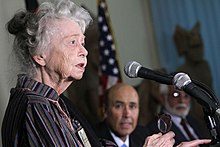Nancy Dupree
| Nancy Dupree | |
|---|---|

Nancy Hatch Dupree giving a speech during the International Architectural Ideas Competition at the National Museum of Afghanistan in September 2012 in Kabul, Afghanistan
|
|
| Born | 1927 (age 89–90) Kerala, India |
| Nationality | American |
| Occupation | Administrator |
| Title | Director of the Afghanistan Center at Kabul University |
| Successor | Incumbent |
Nancy Hatch Dupree (born 1927) is a historian and archaeologist on Afghanistan. She was born in India to American parents and went to Barnard College and Columbia University. She is the director of the Afghanistan Center at Kabul University in Afghanistan and author of five books that she compiled while studying the history of Afghanistan from 1962 until the late 1970s.
Dupree was born in in Kerala (then Travancore) in India, on the Arabian Sea coast. Her parents were working in Kerala on rural development programs, and were also involved in village community drama. Dupree spent most of her childhood in Kerala. She subsequently also lived with her parents in Latin America.
Dupree first arrived in Afghanistan in 1962 as a diplomat's wife. Several years later, she met Louis Duprée, who was a renowned archaeologist and scholar of Afghan culture and history. The two fell in love and got married after divorcing their former spouses. After the Soviet invasion of Afghanistan in 1979, Nancy was forced to leave the country, while Louis remained. Rather than return to the United States, she moved to a refugee camp in Peshawar, Pakistan. Louis was eventually arrested under suspicion of working for the Central Intelligence Agency (CIA) as a spy. He then joined Nancy in Peshawar. While in the refugee camp, Nancy realized the potential for the loss of unique documents about Afghanistan to be lost or destroyed forever. In order to preserve these works and to teach them to a new generation, she and Louis formed the Agency Coordinating Body for Afghan Relief (ACBAR). They began to collect both government and non-government documents that related to the country's history, culture, the Soviet Invasion, the Mujahedeen, and the Taliban. Nancy said that in the looting that began after the Soviet invasion, many priceless books were sold to be used for fuel. A large number of books were also sold by weight to be used to wrap food.
...
Wikipedia
